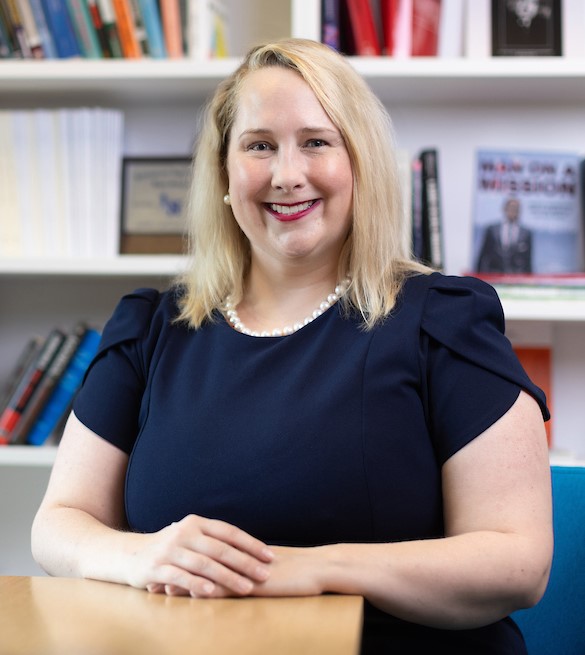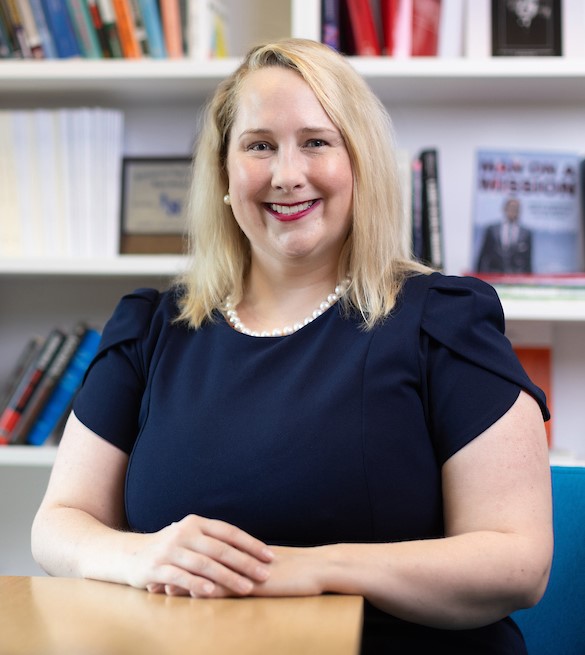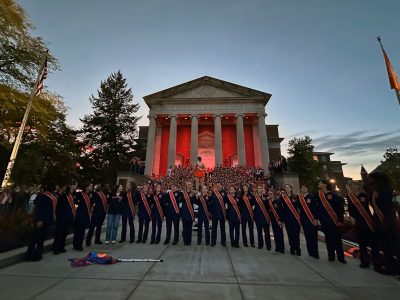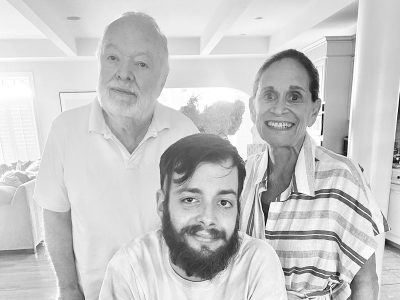New Director Brings Disability Law Expertise and Lived Experience to Disability Law and Policy Program
Katherine Macfarlane, a leading expert on disability law, civil procedure and civil rights litigation, joined the College of Law last summer to lead the groundbreaking Disability Law and Policy (DLPP) program. The program was founded and led by Professor Emerita Arlene Kanter, who retired in June after 35 years of teaching.
Macfarlane’s disability law research and advocacy focus on reasonable accommodations in the workplace and higher education. Macfarlane is herself a person with disabilities. She has had rheumatoid arthritis, an autoimmune disease that causes joint deterioration and visual impairment, since childhood. Her lived experience with disability is one reason she’s excited to direct the DLPP program, she says.
Before joining the faculty as an associate professor last August, Macfarlane served as special counsel for disability rights in the U.S. Department of Education’s Office for Civil Rights, an appointment supported by a grant from the Ford Foundation’s U.S. Disability Rights Program. She previously was an associate professor at Southern University Law Center and the University of Idaho College of Law. She also was an assistant corporation counsel in the New York City Law Department, where she served as lead counsel in federal civil rights actions and an associate in Quinn Emanuel Urquhart & Sullivan’s Los Angeles and New York offices. After law school, she served as a law clerk for the District of Arizona and the U.S. Court of Appeals for the Ninth Circuit.

In addition to her disability law research, Macfarlane writes at the intersection of federal civil procedure and civil rights litigation. Her article about the modern implications of 42 U.S.C. § 1983, the landmark civil rights law originally passed as part of the Ku Klux Klan Act of 1871, has been cited twice by U.S. District Court Judge Carlton Reeves, most recently in Green v. Thomas, an order denying qualified immunity that received national media attention.
New DLPP Initiatives
Macfarlane appreciates that Kanter’s DLPP groundwork has provided an understanding of disability law and policies here.
“The University’s understanding of what it takes to support people with disabilities means I can jump right into the kind of programming I want to do. Things I might have had to fight for at other institutions are a given at Syracuse. That’s so refreshing.”
Through DLPP, Macfarlane wants to empower law students to see themselves as disability law scholars and future academics. She hopes to make this year’s inaugural student scholarship-focused symposium a yearly tradition and continue hosting discussions with cutting-edge disability law scholars and advocates. She plans to spotlight the novel disability law work being done by several law faculty. She will also continue to offer disability knowledge workshops and trainings to departments and faculty at Syracuse and around the country and wants to involve DLPP students in those efforts. She especially hopes to maintain the University’s reputation as a destination for law students interested in disability law and law students with disabilities.
“I want for us as a university to think beyond compliance and consider what it takes to continue to attract students and faculty who have disabilities—how to remain an institution where disabled individuals are supported and s쳮d,” she says. “That means we need to think through the experience of people with disabilities from the minute they arrive on campus and about how to streamline the process of obtaining a reasonable accommodation, for example. We need to ask how much time, money and health insurance a person with disabilities is required to expend and how we can lessen those burdens. Our conversations should reach far beyond a discussion about accessible design and dive into the day-to-day experience of people with disabilities.”
Early Law Interest
Macfarlane lived in Canada and Italy in her youth and always wanted to go to law school. When she moved to the U.S., she was drawn to and inspired by U.S. civil rights movements and civil rights law. Congressman John Lewis is one of her heroes. Her disability law specialty came about later in her career.
“I have been disabled for as long as I can remember, but in law school, I was too self-conscious to identify with the disability community or focus on disability law,” she says. “Well into my twenties, I lived my medical experience in secret, hiding my constant procedures and chronic pain from even my closest friends. Finding the disability community and disability law has been pretty life-changing for me in that I can finally be myself. I became an expert in disability law because I had to in order to protect my own rights, but then I realized I loved this area of the law and the people doing this work, and I never left.”
People with disabilities are underrepresented in the practice of law and academia, Macfarlane says. “Not only is there a real need for people with disability law experience, there is also an absolute need for people with disabilities to go into this area of law. Having more disabled people in the practice of law is a readily attainable goal. But the spaces they work in have to be accessible, too, so law schools, courthouses and law firms have to constantly audit their physical spaces and their disability-related policies,” she says.
DLPP As Leverage
DLPP provides a forum to leverage both objectives, Macfarlane says. “I also love that I can expose students with disabilities to this area of law and advocacy and help give them the confidence to exist as a person with disabilities that I didn’t have myself as a law student. And this generation of law students makes me so excited! They understand what access requires. I’m very interested to see what this generation of young people do when they enter the practice of law or when they come into positions like mine.”
A focus on the specialty requires careful monitoring of litigation and Supreme Court decisions to guard against a decline in disability rights, Macfarlane says. She cites a recent attempt to narrow the Americans with Disabilities Act that could allow businesses to forego making their establishments accessible. She finds it concerning that some recent Supreme Court decisions may foreshadow a lowering of America’s commitment to disability rights as well.
That’s why the DLPP’s efforts are essential, Macfarlane says. “I’m always pitching DLPP to students. Disability law is a vital, cutting-edge area of law; it’s always changing. Many of us come to this specialty because we’re fired up about disability rights in our own lives. That’s why I’m so pleased to be here; it’s tremendous that a person with a disability is at the helm of this program.”


